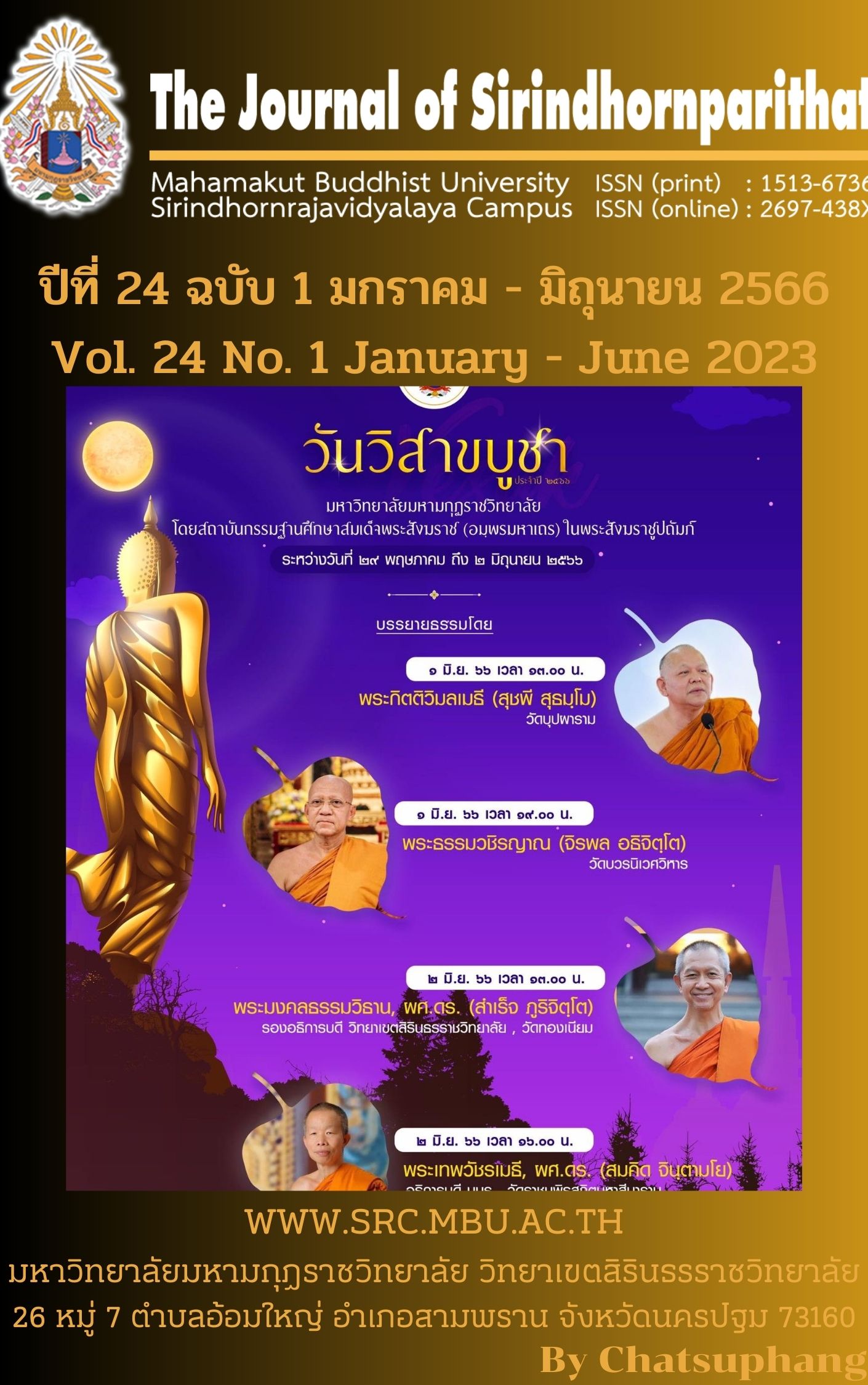Guidelines for Leadership Development According to The Seven Sappurisadhamma of Small School Administrators Under The Office of Ang Thong Primary Education Area
Keywords:
seven principles of Sappurisa Dhamma, The guideline for development of leadershipAbstract
The objectives of this research are: 1) to study the leadership characteristics of administrators in small schools under Office of Ang Thong Primary Educational Service Area, 2) to develop the leadership according to seven principles of Sappurisa Dhamma of administrators in small schools under Office of Ang Thong Primary Educational Service Area, and 3) to propose the guideline for development of leadership according to seven principles of Sappurisa Dhamma of administrators in small schools under Office of Ang Thong Primary Educational Service Area. The mixed research methodology was used in the study.
The research results were found that:
The state of leadership characteristics of administrators in small schools under Office of Ang Thong Primary Educational Service Area was at a high level overall. In each aspect consideration, the highest level was on technical and academic skills, followed by energetic, good decision, interest and attention, creative thinking, good health and self-confidence respectively.
The development of leadership according to seven principles of Sappurisa Dhamma of administrators in small schools under Office of Ang Thong Primary Educational Service Area consists of 47 characteristics in self-analysis, knowing the consequence, life living guideline, knowing moderation, knowing the proper time, knowing the society, knowing the individual, and knowing ingenuity.
The guideline for development of leadership according to seven principles of Sappurisa Dhamma of administrators in small schools under Office of Ang Thong Primary Educational Service Area has 3 aspects; 1) Building awareness and understanding on a particular item by oneself, 2) Building self-discipline, and 3) Self-development by learning, experiences, and suggestions from the skillful
References
จีระ หงส์ลดารมย์. (2546). “ผลต่อการพัฒนาทรัพยากรมนุษย์ คุณภาพชีวิตและเศรษฐกิจไทย”. วารสารคน. 4(1) :27-28.
จุลพล หนิมพานิช. (2541). ผู้นำอำนาจและการเมืองในองค์การ. พิมพ์ครั้งที่ 3. กรุงเทพมหานคร : มหาวิทยาลัยสุโขทัยธรรมาธิราช.
ชัยศักดิ์ ศุกระกาญจน์. (2563). ภาวะผู้นำของผู้บริหารองค์การ. [ออนไลน์] ค้นเมื่อ 17 กรกฎาคม 2563, จาก https://spark.adobe.com/page/YlGxuPO3qkdtE/
ฐนิตนันท์ ทวีกระแสร์. (2557). “การใช้หลักสัปปุริสธรรม 7 ของผู้บริหารสถานศึกษาสหวิทยาเขตเวียงเรือคำ สำนักงานเขตพื้นที่การศึกษามัธยมศึกษาเขต 25”. วิทยานิพนธ์พุทธศาสตรมหาบัณฑิตสาขาวิชาบริหารการศึกษา. บัณฑิตวิทยาลัย: มหาวิทยาลัยจุฬาลงกรณราชวิทยาลัย.
ทิพวดี เมฆสวรรค์. (2545). กล้าคิด กล้าทำ กล้านำ กล้าเปลี่ยน. พิมพ์ครั้งที่ 2. กรุงเทพมหานคร: เอ็กซเปอร์เน็ท.
ธร สุนทรายุทธ. (2551). การบริหารจัดการเชิงปฏิรูป : ทฤษฎีวิจัยและปฏิบัติทางการศึกษา.กรุงเทพมหานคร: เนติกุล.
บุญชัย พิทักษ์ดำรงกิจ. (2540). ผู้นำในยุคโลกาภิวัตน์. วารสารสามิตสาร. 53 : 47-51.
พงศ์ทัศ วนิชานันท์. การศึกษาพื้นฐานในยุค โควิด-19: จะเปิด-ปิดโรงเรียนอย่างไร?. [ออนไลน์] ค้นเมื่อ 17 กรกฎาคม 2563, จาก https://tdri.or.th/2020/05/basic-education-in-covid-19-crisis-reopening-school-after-lockdown/
สำนักงานเลขาธิการสภาการศึกษา. (2560). แผนการศึกษาแห่งชาติ พ.ศ.2560-2579. กรุงเทพมหานคร : บริษัท พริกหวานกราฟฟิค จํากัด.
อรนุช โขพิมพ์. (2555).“ภาวะผู้นำของผู้บริหารตามหลักสัปปุริสธรรม 7 ของผู้บริหารโรงเรียนพระปริยัติธรรม แผนกสามัญศึกษา จังหวัดขอนแก่น”. ปริญญาพุทธศาสตรมหาบัณฑิต สาขาวิชาการบริหารศึกษา. บัณฑิตวิทยาลัย : มหาวิทยาลัยมหาจุฬาลงกรณราชวิทยาลัย.

Downloads
Published
Issue
Section
License
Copyright (c) 2023 Mahamakut Buddhist University

This work is licensed under a Creative Commons Attribution-NonCommercial-NoDerivatives 4.0 International License.
บทความที่ได้รับการตีพิมพ์เป็นลิขสิทธิ์ของ มหาวิทยาลัยมหามกุฏราชวิทยาลัย วิทยาเขตสิรินธรราชวิทยาลัย
ข้อความที่ปรากฏในบทความแต่ละเรื่องในวารสารวิชาการเล่มนี้เป็นความคิดเห็นส่วนตัวของผู้เขียนแต่ละท่านไม่เกี่ยวข้องกับหาวิทยาลัยมหามกุฏราชวิทยาลัย วิทยาเขตสิรินธรราชวิทยาลัย และคณาจารย์ท่านอื่นๆในมหาวิทยาลัยฯ แต่อย่างใด ความรับผิดชอบองค์ประกอบทั้งหมดของบทความแต่ละเรื่องเป็นของผู้เขียนแต่ละท่าน หากมีความผิดพลาดใดๆ ผู้เขียนแต่ละท่านจะรับผิดชอบบทความของตนเองแต่ผู้เดียว



